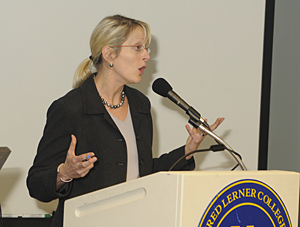

- Rozovsky wins prestigious NSF Early Career Award
- UD students meet alumni, experience 'closing bell' at NYSE
- Newark Police seek assistance in identifying suspects in robbery
- Rivlin says bipartisan budget action, stronger budget rules key to reversing debt
- Stink bugs shouldn't pose problem until late summer
- Gao to honor Placido Domingo in Washington performance
- Adopt-A-Highway project keeps Lewes road clean
- WVUD's Radiothon fundraiser runs April 1-10
- W.D. Snodgrass Symposium to honor Pulitzer winner
- New guide helps cancer patients manage symptoms
- UD in the News, March 25, 2011
- For the Record, March 25, 2011
- Public opinion expert discusses world views of U.S. in Global Agenda series
- Congressional delegation, dean laud Center for Community Research and Service program
- Center for Political Communication sets symposium on politics, entertainment
- Students work to raise funds, awareness of domestic violence
- Equestrian team wins regional championship in Western riding
- Markell, Harker stress importance of agriculture to Delaware's economy
- Carol A. Ammon MBA Case Competition winners announced
- Prof presents blood-clotting studies at Gordon Research Conference
- Sexual Assault Awareness Month events, programs announced
- Stay connected with Sea Grant, CEOE e-newsletter
- A message to UD regarding the tragedy in Japan
- More News >>
- March 31-May 14: REP stages Neil Simon's 'The Good Doctor'
- April 2: Newark plans annual 'wine and dine'
- April 5: Expert perspective on U.S. health care
- April 5: Comedian Ace Guillen to visit Scrounge
- April 6, May 4: School of Nursing sponsors research lecture series
- April 6-May 4: Confucius Institute presents Chinese Film Series on Wednesdays
- April 6: IPCC's Pachauri to discuss sustainable development in DENIN Dialogue Series
- April 7: 'WVUDstock' radiothon concert announced
- April 8: English Language Institute presents 'Arts in Translation'
- April 9: Green and Healthy Living Expo planned at The Bob
- April 9: Center for Political Communication to host Onion editor
- April 10: Alumni Easter Egg-stravaganza planned
- April 11: CDS session to focus on visual assistive technologies
- April 12: T.J. Stiles to speak at UDLA annual dinner
- April 15, 16: Annual UD push lawnmower tune-up scheduled
- April 15, 16: Master Players series presents iMusic 4, China Magpie
- April 15, 16: Delaware Symphony, UD chorus to perform Mahler work
- April 18: Former NFL Coach Bill Cowher featured in UD Speaks
- April 21-24: Sesame Street Live brings Elmo and friends to The Bob
- April 30: Save the date for Ag Day 2011 at UD
- April 30: Symposium to consider 'Frontiers at the Chemistry-Biology Interface'
- April 30-May 1: Relay for Life set at Delaware Field House
- May 4: Delaware Membrane Protein Symposium announced
- May 5: Northwestern University's Leon Keer to deliver Kerr lecture
- May 7: Women's volleyball team to host second annual Spring Fling
- Through May 3: SPPA announces speakers for 10th annual lecture series
- Through May 4: Global Agenda sees U.S. through others' eyes; World Bank president to speak
- Through May 4: 'Research on Race, Ethnicity, Culture' topic of series
- Through May 9: Black American Studies announces lecture series
- Through May 11: 'Challenges in Jewish Culture' lecture series announced
- Through May 11: Area Studies research featured in speaker series
- Through June 5: 'Andy Warhol: Behind the Camera' on view in Old College Gallery
- Through July 15: 'Bodyscapes' on view at Mechanical Hall Gallery
- More What's Happening >>
- UD calendar >>
- Middle States evaluation team on campus April 5
- Phipps named HR Liaison of the Quarter
- Senior wins iPad for participating in assessment study
- April 19: Procurement Services schedules information sessions
- UD Bookstore announces spring break hours
- HealthyU Wellness Program encourages employees to 'Step into Spring'
- April 8-29: Faculty roundtable series considers student engagement
- GRE is changing; learn more at April 15 info session
- April 30: UD Evening with Blue Rocks set for employees
- Morris Library to be open 24/7 during final exams
- More Campus FYI >>
8:28 a.m., Dec. 12, 2008----Jennifer "J.J." Davis, vice president for administration at the University of Delaware, said the current economic recession is a major challenge for the state, which has to make deep spending cuts while dealing with growing demand for services as more people seek Medicaid coverage, transfer their children from private to public schools and tap from unemployment insurance.
Davis, who previously served as cabinet secretary and director of the Office of Management and Budget for the state of Delaware, was speaking during a panel discussion, “The Role of Governments and Markets in Managing the Economy,” during the Lerner College of Business and Economics Advisory Board meeting held Thursday, Dec. 11, on UD's Newark campus.
The other panelists were Donald Puglisi, MBNA Professor Emeritus of Finance and director of Puglisi and Associates, and Ken Biederman, UD professor of finance, who previously served as dean, state treasurer of New Jersey and CEO of two savings banks.
Davis said that while the state is facing a $500 million shortfall in its $3.3 billion budget, which must be balanced, job losses and other financial hardships are driving more people to seek state-funded services.
“Given the current economic climate and a global economic downturn, we are not going to be immune from it,” Davis said. “As you know, when the economy gets into trouble, the government is also the provider of last resort.”
Davis explained that about 33 cents on every dollar of the state budget goes to public education and about 27 cents goes to health and social services, which makes it likely that those services will be affected by cuts.
“When you start to say the pie has to get smaller, it goes into two primary areas. You cannot cut the rest of government and get through it. You will, in very rapid order, hit health and social services and public education, which are very important issues to taxpayers,” Davis said.
Davis said the administration of governor-elect Jack Markell will be under pressure to come up with a budget by June 2009 while incorporating spending cuts, so it should not place limits on itself by ruling out certain cuts or the closing the door on raising more revenue.
The administration also should consider looking at ways to make government more efficient, Davis said.
Davis said economic development is the key to Delaware's success in the future and challenged the audience of two-dozen business leaders to help find the “new next big thing for Delaware.”
“We need more diversification and more innovation if Delaware is going to prosper,” Davis said.
Biederman said the national financial crisis is rooted in problems in the housing market, the tendency by Congress and the administration to conduct policy by running up debt, the banking industry's pursuit of higher stock prices through greater use of secondary markets, as well as Wall Street, which “is constantly living in a world of greed or fear” and works in conjunction with the banking industry.
When put together, Biederman said, those four factors create a witch's brew akin to the monster in a 1956 science fiction film, Forbidden Planet, which comes back uglier, meaner and more devastating than before.
Puglisi said the current financial crisis is linked to a deregulation trend that began in the 1980s and left key investment decisions to financial institutions, which, in turn, gave consumers more freedom to decide where they invested their money and shoulder the risk.
“We have done the same thing in the financial system. We allowed financial institutions unfettered ability to leverage their balance sheets, to go into new areas of financial instruments,” Puglisi said. “We've created tremendous, tremendous systemic risk and that systemic risk has really come home to roost in 2008.”
Puglisi warned that the hundreds of billions of dollars that the federal government has been pumping into financial institutions, whose total far exceeds the $700 billion bailout that was passed by Congress, will make it difficult to extract government from the financial market while the huge money supply will eventually become a problem.
Article by Martin A Mbugua
Photos by Duane Perry


